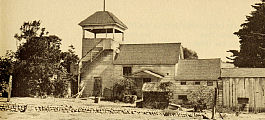











|
     
  
The Journal of San Diego History
SAN DIEGO HISTORICAL SOCIETY QUARTERLY
April 1964, Volume 10, Number 3
Contents of this issue
THE JAGUARINA-WEIDERMANN BATTLE
(From a hitherto unpublished manuscript of the late
Herbert C. Hensley) 
Probably the most exciting sporting event witnessed in San Diego in the eighties was the famous Jaguarina-Weidermann broadsword
contest, held at the Pacific Beach race-track at the foot of Rose Canyon, on Sunday, October 28, 1888. The fight was divided
into eleven rounds (called "attacks") of three minutes each, and at the close the woman was declared the winner by the score
of six to five.
As this result showed, it was a pretty close thing and had the fight gone on, (as the crowd vociferously but unsuccessfully,
demanded), it might have ended differently, for Weidermann was almost a giant in size and an all-round gymnast, besides being
a master of both sword and foil. At this time he was physical director of the German-American Turnverein as well as of the
College of Letters at Pacific Beach; this latter was an early-day academy or college, originally built and which occupied
the old structure which later became the main building of the Brown Military Academy.
It is evident that Jaguarina must have been a remarkable lady. Born in the United States, of an English father and a Spanish
mother, she had spent most of her life in Europe and for the last eight years had been almost constantly engaged in sword-contests
in America and abroad, being uniformly successful. Not long before the meeting with Weidermann she had bested the champion
of the United States army, Sergeant Owen Davis, and also another notable representative of that army, Duncan C. Ross.
Of late years she had resided in Mexico, between bouts, and at this time was living near Ensenada. When the meeting with
Professor Weidermann was arranged, Jaguarina made the trip to San Diego on horseback by way of conditioning her charger, Muchacho,
for the coming fray. In San Diego, she bought another big horse and proceeded to train him, just in case anything happened
to Muchacho.
Jaguarina (I never heard her family or given name) was an exceedingly fine-looking woman with dark hair and eyes but very
fair complexion. I often saw her, from the window of James Harris' bookbinding shop in the old Tremont building where I worked,
strolling composedly along Third street, with a great mastiff on leash. She dressed quietly, though richly, but such was her
personal distinction that she could not but attract attention.
I did not attend that battle. In the first place, it was on Sunday, which settled the matter at the start, and besides,
I hadn't the price of railroad fare plus admission, anyway. But, by all reports, the crowd got its full money's worth. There
were around seven thousand persons present.
The contestants had their "corners" at opposite sides of the enclosure, and at the word rushed upon each other like knights
of old. On their big horses, with flashing swords and breastplates, it must have been a thrilling spectacle. Jaguarina, though
a large and powerful woman, looking, in her street clothes, what you would call a "stylish stout," was much the smaller. But
she made up for that by a tremendous vigor and impetuosity. She constantly forced the fighting, thundering out of her corner
and across the field, to meet the captain almost before he was out of his. She wore a French army officer's cuirass, of copper
and brass, which blazed in the sunshine, as she came tearing across the lists.
Of course, both contestants were masked and helmeted, and besides their breastplates, had their sword-arms well padded.
But at that, what with the rearing and pawing and snorting of their chargers and the ringing whacks of those sure-enough swords,
and the referee and seconds (also mounted) swooping about, it was a gallant sight.
Captain Weidermann may not have heard of the great reputation of his fair antagonist, for when the contest was proposed
he voiced a reluctance to engage in such a rough bout with a woman. And that idea, of chivalry, (though I imagine it did not
last long after the first clash of arms), might possibly have had some little effect on his performance at the start of the
mill.
The contest was marked, almost throughout, by good feeling; and altogether so on the part of the principals, except that
there was one fiery argument joined in by contestants, referee and seconds, resulting in the change of referee, which so scared
Captain Weidermann's second that he dove into the crowd and remained there, perdu, during the balance of the tournament. A
Captain Heilbron quickly took his place.
Jaguarina remained some time in San Diego. She was talented in other ways than with the sword, and a couple of weeks later
took part in an entertainment given by the Turnverein, at Leach's Opera House on D Street, when she sang and posed in classic
living pictures. She and Weidermann also appeared in another contest, this time with foils.
At fencing she showed even greater superiority, winning by a larger margin of points than with the broadsword. These bouts
made a great hit and an attempt was made later to bring the two together for a third meeting. But the captain declined. Probably
he thought that enough was plenty. Could it have been a rough-and-tumble fight with no holds barred, or a melee with clubs
or battle-axes, his chances of victory might have been better; but as it was, apparently the lady was just too fast for him.
|

